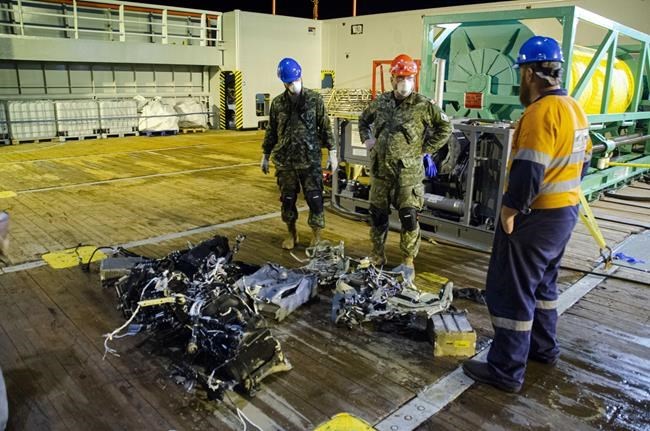OTTAWA — Military investigators are focusing on "aircraft systems and human factors" after determining the Cyclone helicopter that crashed off the coast of Greece in April did not respond as the crew expected before slamming into the Mediterranean Sea.
The Royal Canadian Air Force on Monday released a preliminary investigation report on the crash of the helicopter codenamed Stalker 22, which went down into the Ionian Sea on April 29. Six military members were on board. All of them were killed.
Stalker 22 was participating in what the preliminary report describes as a "routine" reconnaissance mission followed by some additional training with the Halifax-class frigate HMCS Fredericton in the immediate lead-up to the crash.
Military officials have also previously confirmed that it participated in a photo-op with the frigate before going down.
The Cyclone then flew past the Fredericton before turning to set up for landing and, according to the report, "during this final complex manoeuvring turn to close with the ship, the aircraft did not respond as the crew would have anticipated.
"This event occurred at a low altitude, was unrecoverable and the aircraft entered a high energy descent and impacted the water astern the ship."
The Forces initially said contact with the Cyclone was lost, leading to the impression it was far from Fredericton when it went down. Only later did it reveal that members of the frigate's crew had witnessed the crash.
The investigators did not reveal how they discovered what happened, including whether the information came from the flight-data and voice recorders recovered shortly after the crash, eyewitness accounts or pieces of wreckage retrieved from the sea floor.
The military last week wrapped up an eight-day effort to recover pieces of the wreckage as well as any remains of those on board. Some partial remains and parts relevant to the investigation were retrieved, but much of the wreckage was left behind.
The report instead says without elaborating that the investigation will focus "on aircraft systems and human factors." Officials have previously said the full investigation could take up to a year to complete.
"There is still a tremendous amount of work to do to understand the exact circumstances that contributed to the accident," Col. John Alexander, the military's director of flight safety, said in a statement following the report's release.
"We remain committed to conducting a thorough investigation to identify all we can that may contribute to safer flying operations."
While the preliminary report did not delve into the specific causes of the crash, much of the discussion around the incident has focused on the Cyclone's long and problem-plagued development before becoming operational in 2018.
That includes an incident in March 2017 where a software problem in the flight control system caused one of the helicopters to suddenly drop during a test flight. Officials have said the glitch that caused the "triple reset" was subsequently fixed.
Another Cyclone had a "hard landing" on board the navy's interim support ship while deployed in the Pacific in February 2019. The helicopter's manufacturer, Sikorsky, is continuing to develop the aircraft's software to meet the military's full requirements.
That history has raised concerns about whether the cause of Stalker 22's crash is systemic across the rest of the Cyclone fleet. Sikorsky was to have built 28 fully functioning Cyclones by now, but has so far only provided 18.
The Air Force temporarily grounded the remaining 17 Cyclones after Stalker 22 went down. Air Force commander Lt.-Gen. Al Meinzinger said Monday that "operational pause" will continue "until a risk assessment on the fleet can be conducted."
"With the co-operation of the directorate of flight safety, a team of airworthiness experts are working closely to develop a plan to methodically and safely return the fleet to operations," he said. "This is critical work and we will take the time to do it right."
This report by The Canadian Press was first published June 8, 2020.
Lee Berthiaume, The Canadian Press



